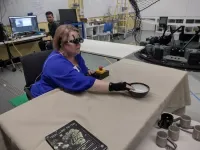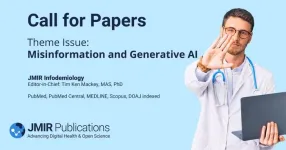(Press-News.org) Older Black Americans are more likely to receive low value acute diagnostic tests than older White Americans, while older White Americans were more likely to receive low value screening tests and treatments, finds a study published by The BMJ today.
Low value care refers to services that provide little to no benefit yet have potential for harm, which can include laboratory tests, scans, and medication.
These differences were generally modest and were largely driven by differential treatment within health systems. But the researchers say the results “highlight the need for health systems to track internal data by race on low value care to identify, understand, and address the sources of racial differences.”
Existing evidence shows that Black patients in the United States are less likely than White patients to receive high value health care, but evidence on racial differences in low value care is scant and mixed.
To address this uncertainty, researchers used Medicare claims data to identify racial differences in the receipt of 40 low value services among nearly 10 million patients (aged 65 or older) at 595 health systems in the United States between 2016 and 2018.
These services fell into four distinct categories: screening tests, acute diagnostic tests, monitoring tests, and treatments.
After adjusting for variables that could influence the results such as patient age, sex, and previous healthcare use, the researchers found that Black patients were more likely to receive low value acute diagnostic tests, including imaging for uncomplicated headache (6.9% v 3.2%) and head scans for dizziness (3.1% v 1.9%).
White patients had higher rates of low value screening tests and treatments, including preoperative laboratory tests (10.3% vs 6.5%), prostate specific antigen tests (31.0% vs 25.7%), and antibiotics for upper respiratory infections (36.6% vs 32.7%).
Further analysis showed that these differences persisted within given health systems and were not explained by Black and White patients receiving care from different systems.
This is an observational study, so can’t establish cause, and the researchers note several limitations. For example, the 40 services examined represent a fraction of all low value care and claims data lack clinical details to confirm clinician intent.
They also point to underlying sources of racial differences, such as clinician-patient interactions (bias, mistrust) or structural issues (access to high quality primary care or differential referral patterns) that may explain why these differences occurred.
“In general, we found Black patients were at modestly greater risk of receiving low value acute diagnostic tests commonly performed in acute care settings, while White patients were at modestly greater risk of receiving low value screening services and treatments,” they write.
“These patterns suggest potential individual, interpersonal, and structural factors that researchers, policy makers, and health system leaders might investigate and address to improve care quality and equity,” they conclude.
In a linked editorial, researchers argue that addressing low value care and equity together is essential to improve patient outcomes.
They say further efforts are needed to explore underlying mechanisms for these inequities, and interventions targeted at narrowing gaps, including addressing implicit and explicit racial biases. It is also worth investigating possible upstream contributors to low value care suggested by this study, such as improving continuity of care as a means to decrease overuse of acute diagnostic tests, they add.
“Bringing together the burgeoning fields of low value care and equity will provide an integrated path toward improving outcomes for all patients,” they conclude.
END
Study examines racial differences in care among older Americans
Differences modest, but results highlight need to improve care quality and equity
2023-10-26
ELSE PRESS RELEASES FROM THIS DATE:
Industry payments to physicians linked to use of some non-recommended and low value drugs among cancer patients
2023-10-26
Patients with cancer whose oncologist receives payments from industry appear more likely to receive some non-recommended and low value treatments, finds a US study published by The BMJ today.
This finding raises potential concerns about quality of care, and the researchers say it may be appropriate to re-examine the current status of personal payments from the drug industry to physicians.
Research shows a consistent link between industry payments and prescribing behaviour, but whether payments to physicians have positive or negative consequences for patient care has not been evaluated empirically, say the ...
Hospitals accused of using foreign doctors as “cheap labour” in fellowship schemes
2023-10-26
English hospital trusts have been accused of using foreign doctors as “cheap labour” as part of fellowship schemes in which they can be paid less than trust-employed doctors and sent home if they become pregnant, an investigation by The BMJ has found.
Foreign doctors come to English hospital trusts as “fellows” as part of the Academy of Medical Royal Colleges’ Medical Training Initiative (MTI) scheme, explains investigations editor, Madlen Davies.
They work for two years in the NHS to gain experience that they will take back to their home countries afterwards. A proportion of fellows are sponsored, for example by their ...
Time to treat the climate and nature crisis as one indivisible global health emergency
2023-10-26
Over 200 health journals across the world have come together to simultaneously publish an editorial calling on world leaders and health professionals to recognise that climate change and biodiversity loss are one indivisible crisis and must be tackled together to preserve health and avoid catastrophe.
The authors say it’s a “dangerous mistake” to respond to the climate crisis and the nature crisis as if they were separate challenges, and urge the World Health Organization to declare this indivisible crisis as a global health emergency.
The editorial is published in leading titles from around ...
Vision via sound for the blind
2023-10-26
ustralian researchers have developed cutting-edge technology known as “acoustic touch” that helps people ‘see’ using sound. The technology has the potential to transform the lives of those who are blind or have low vision.
Around 39 million people worldwide are blind, according to the World Health Organisation, and an additional 246 million people live with low vision, impacting their ability to participate in everyday life activities.
The next generation smart glasses, which translate visual information into distinct sound icons, were developed by researchers from the University of Technology Sydney and the University of Sydney, ...
New study reveals inequities in access to mechanical circulatory support in US patients with cardiogenic shock
2023-10-26
SAN FRANCISCO – A new study presented today at TCT 2023 sought to evaluate the presence of racial, ethnic, and socioeconomic inequities in access to mechanical circulatory support in the United States among patients with cardiogenic shock (CS). The findings, published in the Journal of the Society for Cardiovascular Angiography & Interventions (JSCAI), revealed stark disparities, particularly among Black patients, that further highlight systemic inequities in access to lifesaving therapies.
CS is a life-threatening condition in which your heart suddenly cannot pump enough blood to meet the body’s needs. As a result, your ...
Breast cancer survivors: New training to treat 'chemo-brain'
2023-10-26
A form of computerised attention and memory training can improve impaired attention and memory issues in women treated for breast cancer, University of Reading researchers have found.
‘Chemo-brain’ refers to cognitive problems like forgetfulness, difficulty concentrating, and lapses in everyday attention, which are common side effects of breast cancer treatments including chemotherapy.
The findings, published in the journal Psycho-Oncology, suggest that an adaptive “dual memory tracking” training program may help breast cancer survivors cope ...
Pottery becomes water treatment device for Navajo Nation
2023-10-26
Large chunks of the Navajo Nation in the Southwest lack access to clean drinkable water, a trend that has been rising in many parts of the U.S. in recent years. A research team led by engineers with The University of Texas at Austin aims to change that.
The team has developed a new water filtration solution for members of the Navajo Nation, lining clay pots with pine tree resin collected from the Navajo Nation and incorporating tiny, silver-based particles that can be used to purify water to make it drinkable.
“Making water filtration technology cheap doesn’t solve ...
AWE launching to space station to study atmospheric waves via airglow
2023-10-26
NASA’s Atmospheric Waves Experiment, or AWE, mission is scheduled to launch to the International Space Station in November 2023, where it will make use of a natural, ethereal glow in Earth's sky to study waves in our planet's atmosphere.
Built by Utah State University’s Space Dynamics Laboratory in North Logan, Utah, AWE will be mounted on the exterior of the space station. From this perch, AWE will stare down toward Earth, tracking undulations in the air known as atmospheric gravity waves (AGWs).
Primarily ...
Research advances toward goal of net zero carbon emissions
2023-10-26
Scientists may be on the verge of taking a big step closer to the net-zero carbon emissions goal, thanks to University of Houston research into algae. Hidden potential is being revealed in the major algae studies at the microbial products lab, located at UH at Sugar Land.
The research project is detailed in a newly published article in Green Chemistry, a journal of the Royal Society of Chemistry.
Venkatesh Balan, associate professor of engineering technology in UH’s Cullen College of Engineering’s Division of Technology, is ...
JMIR Infodemiology call for papers theme issue on misinformation and generative AI
2023-10-25
JMIR Infodemiology Editor-in-Chief: Tim Ken Mackey, MAS, PhD welcomes submissions to a special theme issue “Exploring the Intersection Between Health Information, Disinformation, and Generative AI Technologies.”
JMIR Infodemiology, currently indexed in PubMed Central, PubMed, Scopus, DOAJ, and CABI, is a peer-reviewed premier journal in the field of infodemiology, health information, data science, and misinformation and is inviting submissions from different disciplines of health communication, public health, informatics, data science, social ...
LAST 30 PRESS RELEASES:
Iron deficiency blocks the growth of young pancreatic cells
Selective forest thinning in the eastern Cascades supports both snowpack and wildfire resilience
A sea of light: HETDEX astronomers reveal hidden structures in the young universe
Some young gamers may be at higher risk of mental health problems, but family and school support can help
Reduce rust by dumping your wok twice, and other kitchen tips
High-fat diet accelerates breast cancer tumor growth and invasion
Leveraging AI models, neuroscientists parse canary songs to better understand human speech
Ultraprocessed food consumption and behavioral outcomes in Canadian children
The ISSCR honors Dr. Kyle M. Loh with the 2026 Early Career Impact Award for Transformative Advances in Stem Cell Biology
The ISSCR honors Alexander Meissner with the 2026 ISSCR Momentum Award for exceptional work in developmental and stem cell epigenetics
The ISSCR honors stem cell COREdinates and CorEUstem with the 2026 ISSCR Public Service Award
Minimally invasive procedure effectively treats small kidney cancers
SwRI earns CMMC Level 2 cybersecurity certification
Doctors and nurses believe their own substance use affects patients
Life forms can planet hop on asteroid debris – and survive
Sylvia Hurtado voted AERA President-Elect; key members elected to AERA Council
Mount Sinai and King Saud University Medical City forge a three-year collaboration to advance precision medicine in familial inflammatory bowel disease
AI biases can influence people’s perception of history
Prenatal opioid exposure and well-being through adolescence
Big and small dogs both impact indoor air quality, just differently
Wearing a weighted vest to strengthen bones? Make sure you’re moving
Microbe survives the pressures of impact-induced ejection from Mars
Asteroid samples offer new insights into conditions when the solar system formed
Fecal transplants from older mice significantly improve ovarian function and fertility in younger mice
Delight for diastereomer production: A novel strategy for organic chemistry
Permafrost is key to carbon storage. That makes northern wildfires even more dangerous
Hairdressers could be a secret weapon in tackling climate change, new research finds
Genetic risk for mental illness is far less disorder-specific than clinicians have assumed, massive Swedish study reveals
A therapeutic target that would curb the spread of coronaviruses has been identified
Modern twist on wildfire management methods found also to have a bonus feature that protects water supplies
[Press-News.org] Study examines racial differences in care among older AmericansDifferences modest, but results highlight need to improve care quality and equity


